reading
Sunday, 19 September 2021 - 2:08pm
This week, I have been mostly reading:
- The Paradox of Trumpist Patriotism — Joshua Tait in the Bulwark:
Trumpist writers have worked themselves into such a state that they have stretched their critique to include literally half of the American population. As Michael Anton, a former Trump aide who is now a Claremont Institute senior fellow and a Hillsdale lecturer, puts it, “one side loves America, the other hates it—or can tolerate it only for what it might someday become, were the Left’s entire program to be enacted without exception.” Anton, the articulate id of intellectual Trumpism, cuts America in two on religious, linguistic, and even moral grounds, casting the Biden coalition as speaking a babble of languages, worshipping “wokeness” with “Dionysian abandon,” and conceiving of justice solely through the lens of punishment. In a blunt essay, Glenn Ellmers, another Claremont and Hillsdale associate, claims “most people living in the United States today—certainly more than half—are not Americans in any meaningful sense of the term.” In part, Ellmers means that “foreigners who have bypassed the regular process for entering our country, and probably will never assimilate to our language and culture, are—politically as well as legally—aliens.” But Ellmers’s real target is native-born Americans “who may technically be citizens of the United States but are no longer (if they ever were) Americans.” These pretenders “do not believe in, live by, or even like the principles, traditions, and ideals that until recently defined America as a nation and as a people.” Who are the real Americans then? The 74 million who voted for Trump in 2020.
- We’re all teenagers now — Paul Howe in Aeon:
The real world is also replete with examples of adults acting like adolescents in many aspects of their lives. The phrase ‘unintended consequences’ used at the beginning of this essay usually implies negative effects, but there are notable benefits as well. As a result of the gradual absorption of adolescent qualities, we’ve slowly chipped away at many rigidities of the adult world and grown more free-spirited, open and spontaneous […] These youthful character traits have served to make us more accepting and generous in many respects. Rising tolerance towards marginalised groups can be partly attributed to this emergent youthful mindset – a process normally seen as originating with the dynamic social movements of the 1960s and ’70s, but which actually can be detected much earlier in the shifting attitudes of rising generations from the early 20th century onwards. Traits connected to openness have also made us more creative compared with a century ago – contributing to the long-term rise of what the urban theorist Richard Florida has called the ‘creative class’, people who value creativity and individuality in the workplace and other areas of their lives, and thereby contribute greatly to economic innovation and prosperity. The impact of adolescence on the adult world has played a major, and underappreciated, role in generating these vitally important liberating effects that have transformed life for the better over the long haul. But there is an undeniable downside to the story as well. Many authors have traced the pernicious rise of impulsiveness, incivility and me-first brashness across different sectors of US life – social and cultural, economic and political.
- Why it breaks your brain to take a compliment — The Oatmeal:

- The Most Precious Resource is Agency — Simon Sarris:
Who could blame young adults for thinking that work is fake and meaningless if we prescribe fake and meaningless work for the first two decades of their existence? By confining meaningful work to an adult-only activity, it is little wonder that adolescence is a period of great depression. It would be surprising if it was not. Even for smart children, education endlessly ushers them towards an often far and always abstract future, so far and abstract that some children seem to apprise the opposite of agency, they take on a learned helplessness, and downplay that the future is a reality at all.
Sunday, 12 September 2021 - 7:46am
This fortnight, I have been recovering from surgery, tearing through my RSS backlog, and mostly reading:
- Thought for the day — Digby's Hullabaloo:

- Coming in 2040: No Future, the First Punk Rock Nursing Home — Lisa Borders at McSweeney's:
Do the seniors in your life sneer at the idea of decorum? Spit at the mention of Rupert Murdoch, and go into an anti-Reagan rant like it’s 1984 and they’re canvassing for Mondale? Do they insist that none of the good music in the ’80s was played on the radio, except for college radio? Have you found old photos of Grandma when she was 20 wearing Doc Martens, ripped fishnet stockings, and a miniskirt? If you answered “yes” to any of the above, then No Future might be just the place for your elders to rock out their sunset years. Staffed almost entirely by the love children of Henry Rollins, we’re opening our doors in 2040 at this first-of-its-kind facility. From the moment you walk in, you’ll see the difference. Gone are the floral wallpaper borders, the fake oak wainscoting, the lingering scent of Febreze and death you’ll notice in other elder care facilities. We’ve designed No Future to resemble a warehouse squat, the kind in which your loved one likely attended many a gig. Our thin Berber carpeting was custom-ripped, cigarette-burned, and beer-soaked for maximum authenticity.
- Hayek’s Bastards: The Populist Right’s Neoliberal Roots — Quinn Slobodian in Tribune:
Both neoliberals and the new right scorn egalitarianism, global economic equality, and solidarity beyond the nation. Both see capitalism as inevitable and judge citizens by the standards of productivity and efficiency. Perhaps most strikingly, both draw from the same pantheon of heroes. A case in point is Hayek himself, who is an icon on both sides of the neoliberal-populist divide. Speaking alongside Marine Le Pen at the party congress of the French National Front in 2018, self-described populist Steve Bannon condemned the ‘establishment’ and the ‘globalists’ yet built his speech around Hayek’s own metaphor of the road to serfdom, invoking the authority of the master’s name
- Good Morning, I.. WHOA! Uuh, I'll Come Back - Grant Hojohn — Phil Are Go!:

- The Roots of White Evangelicalism’s Crisis Are in White Evangelical Churches, Not Republican Politics — Jesse Curtis in Religion Dispatches:
Within a decade of Jim Crow’s demise, the hottest trend in white evangelical church startups taught that racial diversity in local churches threatened church growth. An influential cadre of white evangelical professors and mission theorists centered at Fuller Seminary assured a new generation of pastors that homogeneous congregations allowed worshippers to feel at home with “Our Kind of People” —i.e. white people—and facilitated healthy church growth. Race was a matter of pragmatism rather than justice; merely a tool that could be used to expand the evangelical coalition. They insisted this had nothing to do with the bad old days of segregation. They were merely finding the most effective ways to spread the gospel. Black evangelical pastors such as Clarence Hilliard warned that a theology of church growth that focused on homogeneous congregations and a personal ticket to heaven was quietly forming deep habits of selfishness in a racist society. It was 1976, and Hilliard wasn’t critiquing the Christian Right, because it didn’t exist. He was warning about what white evangelicals were learning in their own churches.
- Robodebt: A multi-layered policy failure — Peter Whiteford in Progress in Political Economy (PPE):
The Robodebt fiasco involves policy failures across numerous dimensions. The most obvious – and in many ways the least important failure – is that it failed to achieve the budgetary savings that were its main objective. A more important failure is that the Australian government decided to act unlawfully. This was compounded by the failure of the administrative procedures of government to identify and prevent these unlawful acts. Even more seriously, hundreds of thousands of people were adversely affected. This human cost is difficult to assess and involves much more than financial losses. Just over 2,000 people who had received a Robodebt notice between July 2016 and October 2018 died during that period, although in the absence of an official coroner’s report, no causes can be attributed. However, it has been noted that from January 2017, Centrelink began tweeting the contact number for Lifeline, the national charity providing 24-hour support and suicide prevention services.
- This Modern World — by Tom Tomorrow:

- U.S. Military Training Document Says Socialists Represent “Terrorist” Ideology — Ken Klippenstein in the Intercept:
A Navy counterterrorism training document obtained exclusively by The Intercept appears to conflate socialists with terrorists and lists the left-wing ideology alongside “neo-nazis.” A section of the training document subtitled “Study Questions” includes the following: “Anarchists, socialists and neo-nazis represent which terrorist ideological category?” The correct answer is “political terrorists,” a military source briefed on the training told me. The document, titled “Introduction to Terrorism/Terrorist Operations,” is part of a longer training manual recently disseminated by the Naval Education Training and Command’s Navy Tactical Training Center in conjunction with the Center for Security Forces. The training is designed for masters-at-arms, the Navy’s internal police, the military source said.
- Essentialism and Traditionalism in Academic Research — Ryan Kyger and Blair Fix:
‘Essentialism’ is the view that behind real-world objects lie ‘essences’ — a type of eternal category that you cannot observe directly but is nonetheless there. Racial categories are a common type of ‘essence’. To be racist is to attribute to different groups universal qualities that define them as people. Given the long history of racism, it’s clear that humans need little impetus to impose categories onto the world. Still, our instinct to categorize is not always bad. In fact, it’s a key part of science. Looking for patterns is how Dmitri Mendeleev created the periodic table. It’s how John Snow discovered that cholera was water-borne. And it’s how Johannes Kepler discovered the laws of planetary motion. So if categorizing patterns can be helpful, what makes essentialism bad? To be essentialist, in our view, is to reify a category (or theory) into a ‘higher truth’. By so doing, you don’t use evidence to inform a theory. You use theory to interpret evidence … and you don’t consider that you could be wrong.
- Health Drink — xkcd:
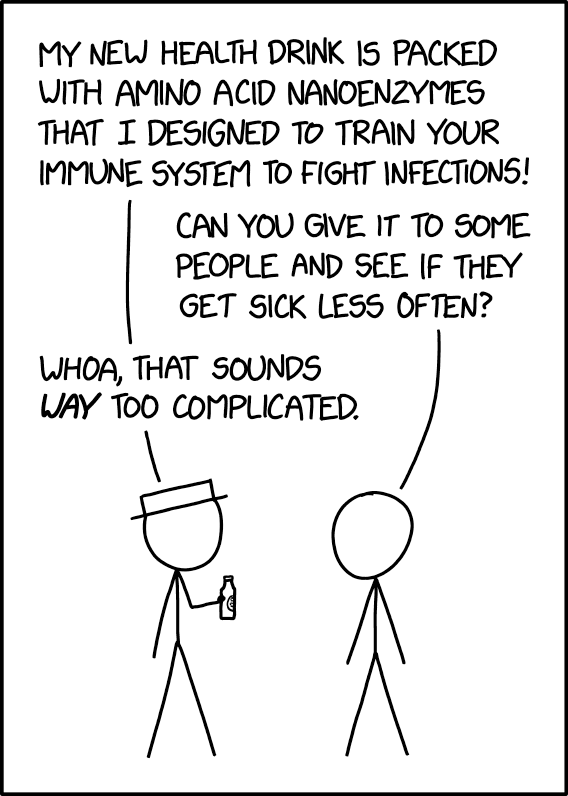
- The Horrifying Rise Of Total Mass Media Blackouts On Inconvenient News Stories — Caitlin Johnstone:
Two different media watchdog outlets, Media Lens and Fairness & Accuracy In Reporting (FAIR), have published articles on the complete blackout in mainstream news institutions on the revelation by Icelandic newspaper Stundin that a US superseding indictment in the case against Julian Assange was based on false testimony from diagnosed sociopath and convicted child molester Sigurdur Thordarson. […] “We have not found a single report by any ‘serious’ UK broadcaster or newspaper,” says the report by Media Lens. “But in a sane world, Stundin’s revelations about a key Assange witness — that Thordarson lied in exchange for immunity from prosecution — would have been headline news everywhere, with extensive media coverage on BBC News at Six and Ten, ITV News, Channel 4 News, front-page stories in the Times, Telegraph, the Guardian and more.”
- Saturday Morning Breakfast Cereal — by Zach Weinersmith:
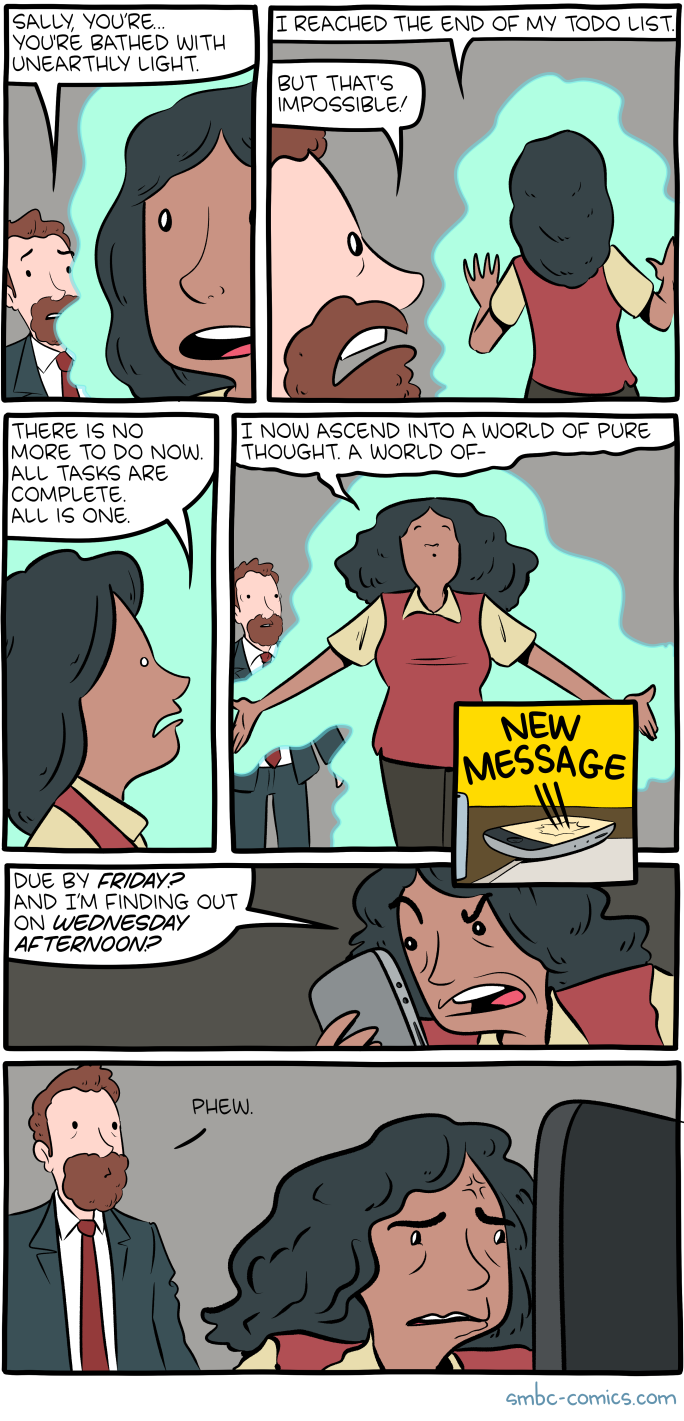
Sunday, 29 August 2021 - 10:35am
This week, I have been mostly reading:
- More Money and Fewer Readers: The Paradox of Subscriber Journalism — Jack Shafer at Politico:
Muckraker George Seldes, one of America’s most accomplished independent journalists, built his paper-and-postage newsletter, In fact, into a 176,000-circulation phenomenon in the late 1940s, outpacing the circulation of both the New Republic and the Nation. Every bit as edgy in his journalistic approach as such Substack all-stars as Glenn Greenwald, Matt Yglesias or Matt Taibbi, Seldes should have gloried in his triumph. Instead, he was depressed by his lack of mass reach. No matter how hard he tried, he lamented in his final issue that he couldn’t connect very far beyond the “$5 liberals” who subscribed to In fact. He wanted a mass audience that would allow him to keep pace with the big newspapers that reached a million subscribers. He wanted his words to land as hard as theirs. Instead, the elite audience he’d cultivated became too much of an echo chamber.
- This Modern World — by Tom Tomorrow:

- Gee, Officer Kristen — Patrick Marlborough in Meanjin:
Have you ever had to explain to somebody that the Holocaust did in fact happen? Maybe a co-worker, or someone on Facebook, or a particularly curious if off-putting child? How about someone who holds your future in their hands? Someone who you’ve watched bully a man with one arm into a job stacking shelves at Coles? Someone who just last week referred to a severely intellectually disabled man as a ‘born slacker’? Have you ever had to turn to that person and explain to them, slowly and delicately, that Hitler was a very real man who did some very bad things and that the Holocaust was not a collective false memory cleverly beamed into our brains by the race of lizard men who secretly run the world? Oh, you haven’t? Well, just imagine you have for a moment. And that at the end of your brief yet exacerbated explanation they turn back to their computer, sniff, and say ‘well, that’s not what I’ve heard’ then tell you there’s a minimum wage job going in a town in the wheat-belt that’s best known for its record breaking suicide statistics—and that you have to take it, or starve.
- The Left Must Take Back Labour — Craig Murray:
If you believe that the Starmer project was a genuine belief that a right wing agenda would get Labour back into power, then the Starmer Project has totally failed on those terms. If you believe that the Starmer project was a scheme to neutralise any threat from Labour to the vast disparity of wealth in the UK and internationally, then it has spectacularly succeeded.
- Bow Down to Me, Pathetic Mortals, For I Have a Loud Engine — Susie Aquilina in McSweeney's:
It has arrived, oh feeble ones, the time for my automobile to barrel through your vicinity and announce my prowess—my vital and irrefutable masculinity. How is it that you know of my unquestioned and eternal virility? I have a vehicle that goes vroom vroom! Oh, how I pity you, you mite of a human, sitting there in silence, with no engine to rev. How you must want for power, that which I possess. The power to irritate everyone within a two-mile radius. This sound that emanates from my swift movement, this amplified mechanical sputtering, exclaims to all my undisputed vigor.
- The Central Banker’s New Clothes — Robert Skidelsky in Project Syndicate:
Friedman ignored what John Maynard Keynes called the “speculative demand for money,” which the British economist Ralph Hawtrey had succinctly identified in 1925. “When trade is slack, traders accumulate cash balances because the prospects of profit from any enterprise are slight, and the rate of [return] from any investment is low,” Hawtrey said. “When trade is active, an idle balance is a more serious loss, and traders hasten to use all their resources in their business.” This means that the state of the economy determines the quantity of money in circulation, and not vice versa. Uncertainty about future inflation is only one of many factors affecting business decisions, which reflect firms’ expectations of “customers at the door.” A central bank’s ability to control the price level and the level of economic activity through purely monetary operations is thus very limited. The bottom line is that for money to affect the economy in a predictable way, it must be spent in a predictable way. And that can happen only if the spender is the government.
- Saturday Morning Breakfast Cereal — by Zach Weinersmith:
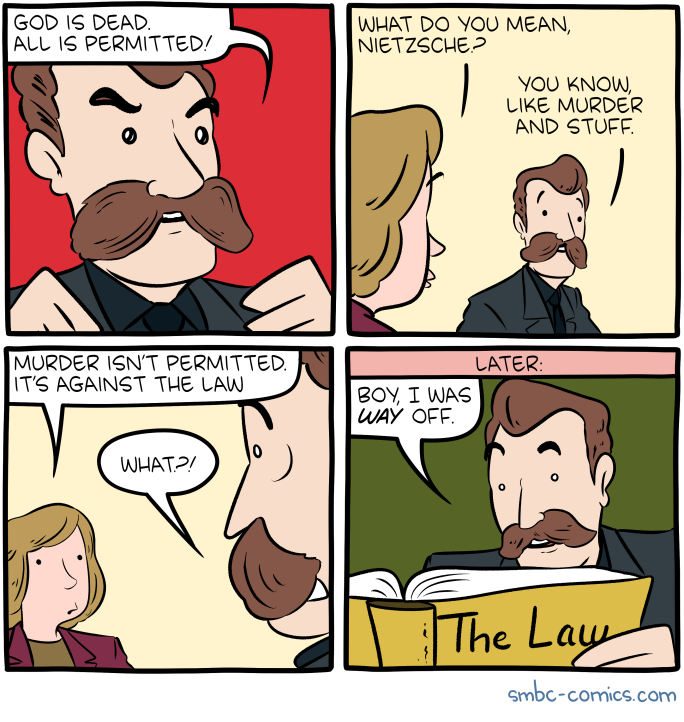
- What the ephemerality of the Web means for your hyperlinks — John Bowers, Clare Stanton, and Jonathan Zittrain in Columbia Journalism Review:
Our team of researchers at Harvard Law School has undertaken a project to gain insight into the extent and characteristics of journalistic linkrot and content drift. We examined hyperlinks in New York Times articles, starting with the launch of the Times website in 1996 up through mid-2019, developed on the basis of a data set provided to us by the Times. […] We found that of the 553,693 articles within the purview of our study––meaning they included URLs on nytimes.com––there were a total of 2,283,445 hyperlinks pointing to content outside of nytimes.com. Seventy-two percent of those were “deep links” with a path to a specific page, such as example.com/article, which is where we focused our analysis (as opposed to simply example.com, which composed the rest of the data set). Of these deep links, 25 percent of all links were completely inaccessible. Linkrot became more common over time: 6 percent of links from 2018 had rotted, as compared to 43 percent of links from 2008 and 72 percent of links from 1998. Fifty-three percent of all articles that contained deep links had at least one rotted link.
Sunday, 22 August 2021 - 12:42pm
This week, I have been mostly reading:
- Son, It’s Time You Learned About Sex by Discussing David Bowie’s Huge Bulge in Labyrinth — Nathan Kamal in McSweeney’s Internet Tendency:
Hey sport, how you doing? Sorry to interrupt your homework, but you probably don’t mind, do you? Listen, son. Your mother and I had a discussion, and we think it’s time you learned about sex by discussing David Bowie’s huge crotch bulge in the movie Labryinth. I know, I know. This is awkward for me too. I wish my dad had been able to show me rock chameleon David Bowie’s enormous package when I was your age. But he was from a different generation, and also the movie wasn’t released until 1986.
- Racist hate crimes targeting Sydney's Indigenous homeless — Joanna Psaros in Independent Australia:
On Wednesday 24 March, Michael*, an Indigenous man, was asleep on Eddy Avenue outside of Central Station when he was shaken awake. A friend urgently warned him that known intruders – “Black haters” wearing jackets adorned with swastikas – were on the way. Michael was not fast enough and, less than a kilometre from Surry Hills Police Station, was violently beaten. Michael was not the only casualty that night. And that night was not the first that Sydney’s homeless were awoken to the reality of White supremacy while the rest of Australia’s eyes remained firmly shut.
- Doonesbury — by Garry Trudeau:
- Hollywood Lobbyists Intervene Against Proposal to Share Vaccine Technology — Lee Fang at the Intercept:
Advocates for temporarily suspending copyright enforcement claim that a truly global response to the pandemic requires open access to knowledge. While most of the public attention has been on vaccines, copyright enforcement also forbids sharing industrial designs used for the manufacturing of ventilators and other medical products crucial to fighting the pandemic. As early as last March, engineers who produced 3D-printed spare parts for ventilators faced warnings from corporate lawyers for potentially infringing on intellectual property and copyright protections. “The MPA, the music industries really aggressively resist any kind of copyright policy that bends toward access,” said Sean Flynn, director of the information justice and intellectual property program at the American University College of Law. This is not the first time that Hollywood lobbyists have intervened on a human rights-related treaty to maintain protections for copyrighted products.
- As a Centrist Democrat, I Ran on a Promise to Fix Killer Shower Clowns. But Now That I’m in Office, I Believe We Should Consider the Issue More Cautiously — Nathan Spring in McSweeny's:
For years, I’ve been going back and forth on whether or not there should be an organized response to these deadly clowns with spiders for hair behind the shower curtain, and I just don’t think the research is there yet. Of course, I’m very concerned about the one with two different colored eyes that screams my deepest secrets, but I’m just not sure I really want Big Government in my home. […] In a way, aren’t specially trained federal agents in our homes just as dangerous as that one clown that seems to be moving backward in time? I just think people overlook a lot of nuances. How you wish to deal with your shower clowns is a very personal decision. If we take that choice away, some people could actually be worse off. Some families might have access to magical weaponry or some sort of Omega Cube; if we get the federal government involved, do they lose access to those avenues? Is that fair?
Sunday, 8 August 2021 - 8:19am
This week, I have been mostly reading:
- Q for Conspiracy — Margaret Simons in Meanjjin:
Elliot Brennan, research associate at the United States Studies Centre, a research centre at the University of Sydney, has identified QAnon theories spreading through parenting websites and the ‘wellness’ movement—which includes the Pete Evans network. ‘If the current global conspiracy theory landscape were like a bath, QAnon would be the drain around which the entire body of water is spiralling,’ he writes. […] It’s best to put aside, so far as you are able, rigid ideas of left and right in trying to understand QAnon. Think that organic food is something inner-city lefties worry about? When the so-called ‘QAnon shaman’—the man in the horned head dress arrested after the Capitol Hill riots—requested organic food in prison, he was true to type. Organic food is big with QAnon—part of its suspicion of big business and chemical companies in particular. […] The wellness industry—naturopathy, homeopathy—is a recognised ‘soft’ path into the QAnon world. And who of us has not taken a vitamin supplement for which there is no, or only dubious, scientific evidence?
- The Insecurity Industry — Edward Snowden:
Prior to this week’s Pegasus Project, a global reporting effort by major newspapers to expose the fatal consequences of the NSO Group—the new private-sector face of an out-of-control Insecurity Industry—most smartphone manufacturers along with much of the world press collectively rolled their eyes at me whenever I publicly identified a fresh-out-of-the-box iPhone as a potentially lethal threat. Despite years of reporting that implicated the NSO Group’s for-profit hacking of phones in the deaths and detentions of journalists and human rights defenders; despite years of reporting that smartphone operating systems were riddled with catastrophic security flaws (a circumstance aggravated by their code having been written in aging programming languages that have long been regarded as unsafe); and despite years of reporting that even when everything works as intended, the mobile ecosystem is a dystopian hellscape of end-user monitoring and outright end-user manipulation, it is still hard for many people to accept that something that feels good may not in fact be good. Over the last eight years I’ve often felt like someone trying to convince their one friend who refuses to grow up to quit smoking and cut back on the booze—meanwhile, the magazine ads still say “Nine of Ten Doctors Smoke iPhones!” and “Unsecured Mobile Browsing is Refreshing!”
- I’m a Parkland Shooting Survivor. QAnon Convinced My Dad It Was All a Hoax. — David Gilbert at Vice:
Bill’s final semester at Marjory Stoneman Douglas High School in Parkland, Florida, was already difficult enough. He was part of the final graduating class of survivors of the 2018 shooting, and they all had just marked the third anniversary of the day 17 people were killed, nine of whom were Bill’s classmates. But Bill also had to deal with his father’s daily accusations that the shooting was a hoax and that the shooter, Bill, and all his classmates were paid pawns in a grand conspiracy orchestrated by some shadowy force.
- Snakes and Ladders — Stefan Collini in the London Review of Books:
Most people seem able to accept considerable inequality in outcomes if they believe that the procedures that lead to these outcomes are in some broad formal sense ‘fair’; that is, they don’t probe too much into what determines the distribution of advantage before the selection procedure begins. Perhaps most of us are inclined, at least some of the time, to think that ability and effort are the things most ‘deserving’ of differential rewards. And many people are more bothered, it seems, by the thought that some individuals may be ‘getting something for nothing’ (in the form of benefits, for example) than the thought that some individuals are paid a thousand times as much as others. There may be no entirely coherent or justifiable basis for these views, but their persistence makes it difficult to build support for fundamental change, just as ingrained notions of what one should be entitled to do for one’s children set narrow limits on what are considered acceptable forms of redistribution. Moreover, like lottery players more generally, many of us seem to prefer to fantasise about ‘making it’ within the existing system than to accept the overwhelming evidence that the odds are rigged against us.
- Dinosaur Comics! — by Ryan North:

- Anatomy of a Stock Market Bubble — Frank Veneroso at the Levy Institute:
With respect to moral hazard, the bailout measures during the 2007–9 crisis along with the quantitative easing policies that followed are just the most recent instances in a half-century pattern of ever-greater policy interventions that have distorted risk perceptions. Although low interest rates have not played a major role in past price-chasing bubbles, very low rates contributed to the duration and amplitude of the stock market’s trajectory over most of the last decade, and have operated as a signal to market participants that reinforces the moral hazard dimension. Regarding the growth of credit, although the Federal Reserve’s statistics do not reflect it, the United States has experienced a massive increase in nonfinancial enterprise debt. Due to a sustained high rate of corporate equity purchases financed with debt, this overarching expansion of credit has also made its way into the last decade’s bull market and steepened its price trajectory.
- The Future of Australian Universities: Bogans of the Pacific — Dr Binoy Kampmark for the Australian Independent Media Network:
The assault on science teaching and research is not merely the work of the surfeit barbarians in the chancellery. Australian higher education is imperilled, not merely by a university management class keen to squeeze students and productive staff into oblivion but a Federal Parliament that sees little value in them. A country facing the sharper side of climate change, brutal weather, environmental destruction and energy crises would be expected to be pouring money into degrees directed towards their study. But scientific illiteracy, along with other forms, is as contagious as the novel coronavirus. In October 2020, changes made to higher education with the blessing of the Centre Alliance and One Nation parties in the Australian Senate saw an effective reduction of 29% to the subject of environmental science. Dianne Gleeson, president of the Australian Council of Environmental Deans and Directors, called this budgetary slicing “one of the largest funding cuts to any university course.”
Sunday, 25 July 2021 - 3:36pm
This week, I have been mostly reading:
- The Betrayal At The Heart of Sanders, AOC and Corbyn’s Refusal To Use Power — Ian Welsh:
Here’s a rule: power everyone knows you won’t use, you don’t have. Left-wingers are not credible because they never use their power. We saw this with Corbyn in Britain when he repeatedly refused to throw out MPs who challenged him or allow MPs to be re-selected (primaried, in effect.) There was nothing they couldn’t do to his cause or him that would get him to retaliate. […] Voters don’t like wimps who won’t use their power and they are correct in this: if you won’t fight, it doesn’t matter what you believe. Corbyn was the man who could take any punch, but would never throw one, no matter what his opponents did.
- Vaccine Guidance — xkcd by Randall Munroe:
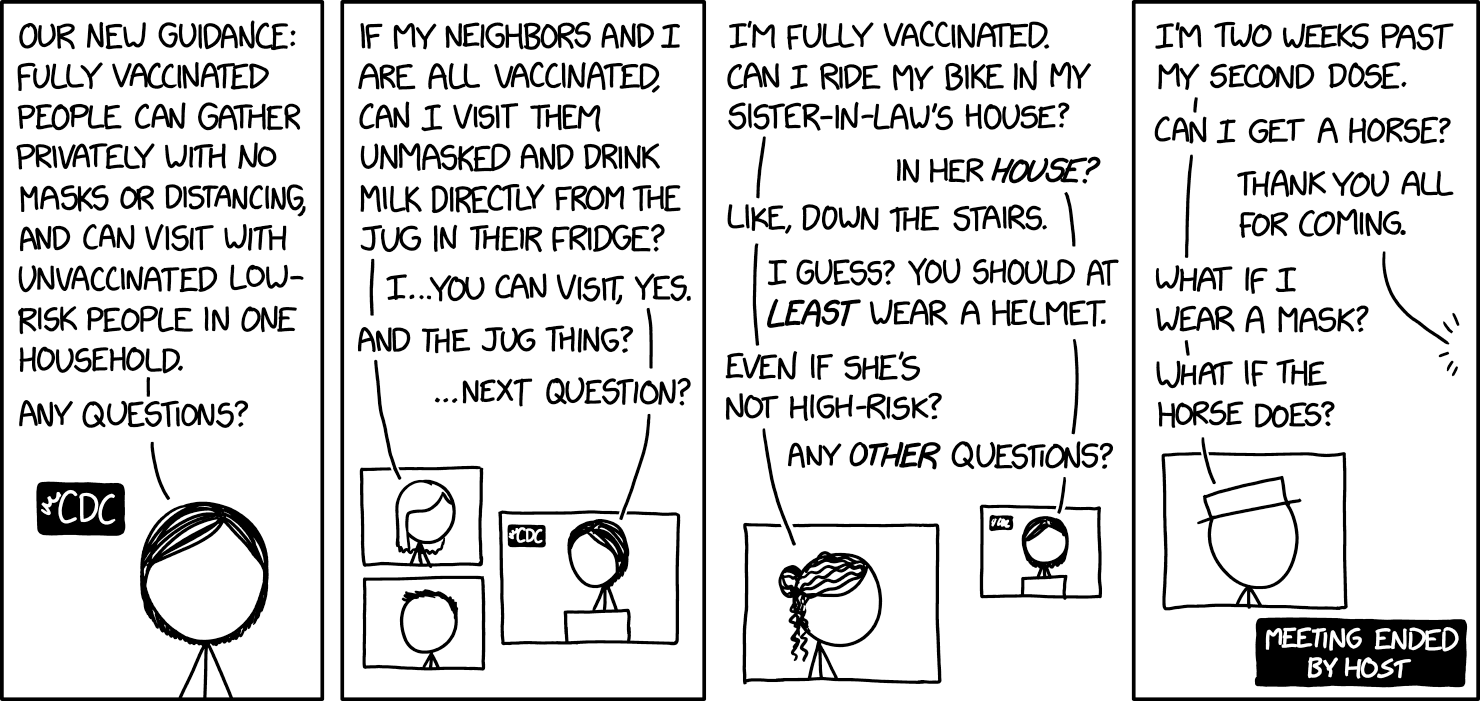
- Dewey, Piaget, and Frosted Mini Wheats — Alfie Kohn:
John Dewey described how a curriculum that’s based on students’ questions and connects with their experiences has “an inherent attracting power.” But creating such a curriculum takes time and skill, and it also requires the adult to make the learners themselves the “center of gravity” in the classroom. It’s considerably easier, Dewey pointed out, just to take a prefabricated lesson, which may not be particularly relevant or meaningful to students, “and then by trick of method to arouse interest, to make it interesting; to cover it with sugar-coating; to conceal its barrenness by intermediate and unrelated material.” These days an awful lot of such sugarcoating is done digitally — for example, with apps that add points and levels to “gamify” a list of decontexualized facts or skills that students are required to master. When you get right down to it, much of ed tech is really an exercise in sugarcoating. But so are plenty of well-established analog schemes: desperately perky sidebars in textbooks to distract students from the dreariness of the main text; contrived word problems in math to create the appearance of relevance for what is still just an exercise in mechanically applying formulas and algorithms; classroom test-prep sessions restyled as TV game shows in which students are made to compete to see who has crammed more bits of useless knowledge into short-term memory.
- Bizarro — by Wayno & Piraro:

- 'I'm sorry, but it's too late' - unvaccinated patients beg for shot — USA Today pays John Bacon and Jorge L. Ortiz to read Facebook so we don't have to:
Dr. Brytney Cobia, a hospitalist at Grandview Medical Center in Birmingham, wrote in a recent Facebook post she is treating a lot of young, otherwise healthy people for serious coronavirus infections. "One of the last things they do before they're intubated is beg me for the vaccine," she wrote. "I hold their hand and tell them that I'm sorry, but it's too late." In her post, Cobia wrote that when a patient dies, she hugs their family members and urges them to get vaccinated. She said they cry and tell her they thought the pandemic was a "hoax," or "political," or targeting some other age group or skin color.
Sunday, 11 July 2021 - 2:50pm
This week, I have been mostly reading:
- Do Adults Really Not Remember School Sucked? — Ian Welsh:
School is, well, mostly bad. It teaches things slowly, it mostly trains obedience, and it’s a social horror show. When we say social dynamics are like high school, we never mean anything good, and there are dozens of movies about how awfully students treat each other. And most of what is taught in school and university is quickly forgotten. I used to amuse myself by asking recent university grads what they had learned, most of them could barely remember anything. Since I was widely read, often I knew enough to ask basic questions about their discipline, and they wouldn’t know the answers.
- How to Write About Iran: A Guide for Journalists, Analysts, and Policymakers — Ladane Nasseri in McSweeney's Internet Tendency:
Whether you are working from your DC office or your home in LA or New York, here’s all you need to know to become an expert on Iran. 1. Always refer to Iran as the “Islamic Republic” and its government as “the regime” or, better yet, “the Mullahs.” 2. Never refer to Iran’s foreign policy. The correct terminology is its “behavior.” When U.S. officials say Iran “must change its behavior” and “behave like a normal country,” write those quotes down word for word. Everyone knows that Iran is a delinquent kid that always instigates trouble and must be disciplined.
- Dinosaur Comics — Ryan North:

- Four-day week 'an overwhelming success' in Iceland — by somebody who doesn't get a byline for lightly editing a press release, at the BBC:
Trials of a four-day week in Iceland were an "overwhelming success" and led to many workers moving to shorter hours, researchers have said. The trials, in which workers were paid the same amount for shorter hours, took place between 2015 and 2019. Productivity remained the same or improved in the majority of workplaces, researchers said. A number of other trials are now being run across the world, including in Spain and by Unilever in New Zealand. In Iceland, the trials run by Reykjavík City Council and the national government eventually included more than 2,500 workers, which amounts to about 1% of Iceland's working population.
- The Delusional Scam of the Self-Help Book Industry — Ed Zitron:
These books are adjacent to the world of personal branding, usually promising to provide an illuminating 100-300 pages of tips that will totally change your life. A commenter added an important addition to the thread that these books usually make vast assumptions about what things a person can actually change in their life, describing them as “the actual start point of an echo chamber,” and she’s totally right - these books are written for and geared toward a very specific audience of privileged individuals who have their life decisions affirmed and their failures explained away. The specific assumption they make is that everybody comes from the same sort of background - that they communicate in the same way, that they grow up the same way, and that, much like the world of advice articles and hustle culture, your failure to succeed is only a result of you not working hard enough. […] It’s frustrating, because these books are inherently manipulative. Their most crucial failure is the make-believe positivity of the world - even when they frame life as difficult or challenging, they couch that framing with the idea that it is just hard work that will make you succeed. Agents and publishers likely don’t want to put books on the stands that give advice that basically says “if you didn’t grow up with some form of wealth or privilege, you are going to have a 1000% harder time doing anything this book says.” Framing the world correctly - as oppressive and depressing to most people - isn’t the encouragement that people are looking for, and would be considered “cynical” or “polarizing.”
- Normal Conversation — xkcd by Randall Munroe:
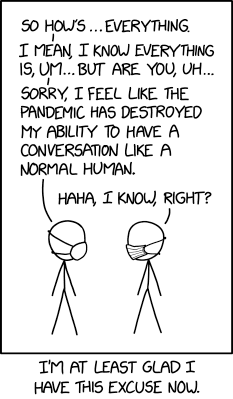
Sunday, 27 June 2021 - 10:08am
Last month, I was mostly lying on my back and groaning, but also reading:
- Anti-vaxxers are weaponizing Yelp to punish bars that require vaccine proof — Tanya Basu in MIT Technology Review makes one so glad to be a member of this species:
On the first hot weekend of the summer, Richard Knapp put up a sign outside Mother’s Ruin, a bar tucked in Manhattan’s SoHo neighborhood. It had two arrows: one pointing vaccinated people indoors, another pointing unvaccinated people outdoors. The Instagram post showing the sign (above) quickly went viral among European anti-vaxxers on Reddit. “We started receiving hate mail through the Google portal,” Knapp says, estimating he’d received about a “few dozen” emails: “I’ve been called a Nazi and a communist in the same sentence. People hope that our bar burns down. It’s a name and shame campaign.” It wasn’t just the emails. Soon, his bar started receiving multiple one-star reviews on Yelp and Google Reviews from accounts as far away as Europe.
- Bloom County — by Berkeley Breathed:
- Not ‘Apartheid in the West Bank.’ Apartheid — Gideon Levy in Haaretz:
It’s impossible to separate the territories and Israel, and it’s impossible to consider the occupation temporary. The conclusion: Israel is an apartheid state. Just as in South Africa it was ludicrous to talk about democracy, even though elections were held, it’s ridiculous to view Israel as a democracy. If part of it is tyranny, all of it is tyranny. It’s impossible to argue with the fact that in the occupied territories two systems of rights and laws exist based on the separating of nationalities. No fact is more certain. The temporariness of the occupation is also an outdated argument. That’s why we have to stop trying to terrify people and claim that the right wing is leading us to apartheid. Apartheid has been here since 1948.
- Simulated Person Monthly — Phil Are Go!:

- YouTube Financially Deplatforms Swath Of Indie Media Accounts — :
Progressive commentators Graham Elwood, The Progressive Soapbox, The Convo Couch, Franc Analysis, Hannah Reloaded and Cyberdemon531 have all received notifications from YouTube that their videos are no longer permitted to earn money through the platform’s various monetization features, as has Ford Fischer, a respected freelancer who films US political demonstrations. No explanation has been offered for this decision beyond the vague claim that “your channel is not in line with our YouTube Partner Program policies” due to “harmful content”. […] Financial deplatforming is censorship. People were given an opportunity to devote themselves to the vocation of creating media outside the gatekeeping apparatus of billionaire news institutions, which is arguably the single most important vocation anyone can give themselves to in our world right now, and they built their lives around their ability to do this. Now it’s being ripped away from them; their literal jobs are being taken away. They were offered a reason to think they’d be able to make a living doing very important work, and then they were sucker punched with what amounts to political censorship.
As Yves Smith succinctly put it, "if your business depends on a platform, you don’t have a business". - Bizarro — by Wayno and Piraro:

- YouTube Bans and Then Unbans Right Wing Watch, a Media Watchdog Devoted to Exposing Right-Wing Conspiracies — Justin Baragona at the Daily Beast:
Right Wing Watch senior fellow Kyle Mantyla told The Daily Beast that this had been an ongoing problem with YouTube for years, despite their efforts to make clear to the platform that their videos worked to expose extremism and contained disclaimers to that effect. […] Launched in 2007, Right Wing Watch has posted thousands of clips of prominent right-wing figures making controversial comments, perhaps most famously including televangelist Pat Robertson and conspiracy theorist Alex Jones. In fact, Right Wing Watch’s exposure of Jones’ false and conspiratorial rhetoric was key to YouTube and other social-media platforms eventually removing his channel InfoWars from their sites. Notably, many of the right-wing outlets and personalities that Right Wing Watch chronicles are not currently suspended or banned from posting content to YouTube, while RWW has been booted for merely exposing their comments and content—something Mantyla noted as being particularly ironic.
- Bloom County — by Berkeley Breathed:
Sunday, 13 June 2021 - 3:35pm
This week, I have been mostly reading:
- Phil Are Go!:

- ‘Journalists’ Who Smear Assange Are Pure Scum — Caitlin Johnstone, who I wish would stop being so circumspect and just say what she thinks:
If I had written an article in a major publication claiming there was “no real reason” to believe Assange would face extradition proceedings if he left the Ecuadorian embassy, and then that claim had proved horrifyingly wrong, I personally would have done what any normal person would do and shut the entire fuck up about Julian Assange for the rest of my life. Not James Ball though. There’s a certain type of personality that guarantees it will always fail upward because it possesses a remarkable combination of power-worshipping obsequiousness, a total lack of shame, and a complete lack of scruples. It’s the same type of personality that still gets lucrative punditry work after pushing for the Iraq invasion. James Ball has no more business opining about Julian Assange than John Bolton has about the merits of interventionist foreign policy, yet both remain visible and vocal. Because they are the same kind of creature. I’m pretty good with words, but I’ve never succeeded in finding any which adequately articulate the absolute depravity of the mass media smearmeisters who’ve spent years getting paid to churn out deceitful hit pieces about Assange while he’s silenced and unable to defend himself. There’s simply no one lower. There’s shit, there’s the shit that would come out of shit if shit could shit, and then there’s people like James Ball.
- The world's greatest democracy — This Modern World by Tom Tomorrow:

- CEOs are hugely expensive – why not automate them? — Will Dunn at the New Statesman:
In the longer term, as companies commit to greater automation of many roles, it's pertinent to ask whether a company needs a CEO at all. A few weeks ago Christine Carrillo, an American tech CEO, raised this question herself when she tweeted a spectacularly tone-deaf appreciation of her executive assistant, whose work allows Carrillo to “write [and] surf every day” as well as “cook dinner and read every night”. In Carrillo’s unusually frank description of the work her EA does – most of her emails, most of the work on fundraising, playbooks, operations, recruitment, research, updating investors, invoicing “and so much more” – she guessed that this unnamed worker “saves me 60% of time”. […] If most of a CEO's job can be outsourced, this suggests it could also be automated. But while companies are racing to automate entry- and mid-level roles, senior executives and decision makers show much less interest in automating themselves.
- Bloom County — by Berkeley Breathed:
- Trump's Failed Blog Proves He Was Just Howling Into the Void — Philip M. Napoli at Wired:
As platforms like Twitter and Facebook generated massive user bases, introduced scrolling news feeds, and developed increasingly sophisticated algorithmic systems for curating and recommending content in these news feeds, they became a vital means by which online attention could be aggregated. Users evolved, or devolved, from active searchers to passive scrollers, clicking on whatever content that their friends, family, and the platforms’ news feed algorithms put in front of them. This gave rise to the still-relevant refrain “If the news is important, it will find me.” Ironically, on what had begun as the quintessential pull medium, social media users had reached a perhaps unprecedented degree of passivity in their media consumption. The leaned-back “couch potato” morphed into the hunched-over “smartphone zombie.” The failure of Trump’s blog tells us that even the kind of impassioned political extremists that form the core of Trump’s base of support are so entrenched in their passive, social-media-dependent mode of media consumption that a traditional blog, absent accompanying social media accounts to generate algorithmic amplification, is incapable of gaining a fraction of the online engagement that a single tweet could achieve. Not even the most public of public figures can break free from the platform dependency that largely dictates the distribution of audience attention online. If Trump’s blog can’t gain traction without direct access to the audience aggregation and amplification tools of social media, then perhaps nothing can.
- Rob Rogers:
- Consent-Manufacturing For Patriot Act II Continues — Caitlin Johnstone again:
As we discussed previously, Biden has often boasted of being the original author of the Patriot Act years before it was rapidly rolled out amid the fear and blind obsequiousness of the aftermath of 9/11. Now in the aftermath of the Capitol riot we are seeing a push to roll out new authoritarian laws around terrorism, this time taking aim at “domestic terror”, which were also in preparation prior to the event used to manufacture support for them. In a new article for Washington Monthly titled “It’s Time for a Domestic Terrorism Law”, Bill Scher argues against left-wing critics of the coming laws like Glenn Greenwald and Jacobin’s Luke Savage saying such “knee-jerk reactions” against potential authoritarian abuses fail to address the growing problem. He opens with the acknowledgement that “Joe Biden’s transition team was already working on a domestic terrorism law before the insurrection,” and then he just keeps on writing as though that’s not weird or suspicious in any way.
Sunday, 30 May 2021 - 8:53am
This week, I have been mostly reading:
- Snopes Debunked the World. Then the World Changed. — Colin Dickey in Medium:
Reading Snopes in the era of urban legends reassured us that the world wasn’t as scary as we thought, but it did more than that. Urban legends also have the capacity to generate shame. Believing them is seductive, but as soon as one is debunked, you might feel dumb and sheepish for thinking you could ever believe it in the first place. Snopes allowed us to feel superior to those who’d been duped while covering up our own gullibility. […] These days, most of the Top 50 stories on Snopes (as of this writing) are explicitly political: rumors, lies, and fabricated screenshots concerning Joe Biden, Alexandria Ocasio-Cortez, Kamala Harris, and Nancy Pelosi. Others are attempts to unravel the still-unfolding story of what happened on January 6, when a conspiracy theory–addled mob launched a treasonous assault on the Capitol. The site still does the work of debunking, but surfing it now is an exercise in exhaustion and dismay. […] These tales remind their listeners that the world is indeed dangerous — Democrats with their socialism, Muslims with their sharia law, Mexicans with their job-taking-what-have-you — but no longer is the message to stay at home with your family and be safe. Instead, they stoke anger, weaponize partisanship, and foster tribalism. These stories are about team-building as much as anything else. And their goal is increasingly to convince you to take to the streets and take back what’s (presumed to be) yours.
- Bored — Saturday Morning Breakfast Cereal by Zach Weinersmith:
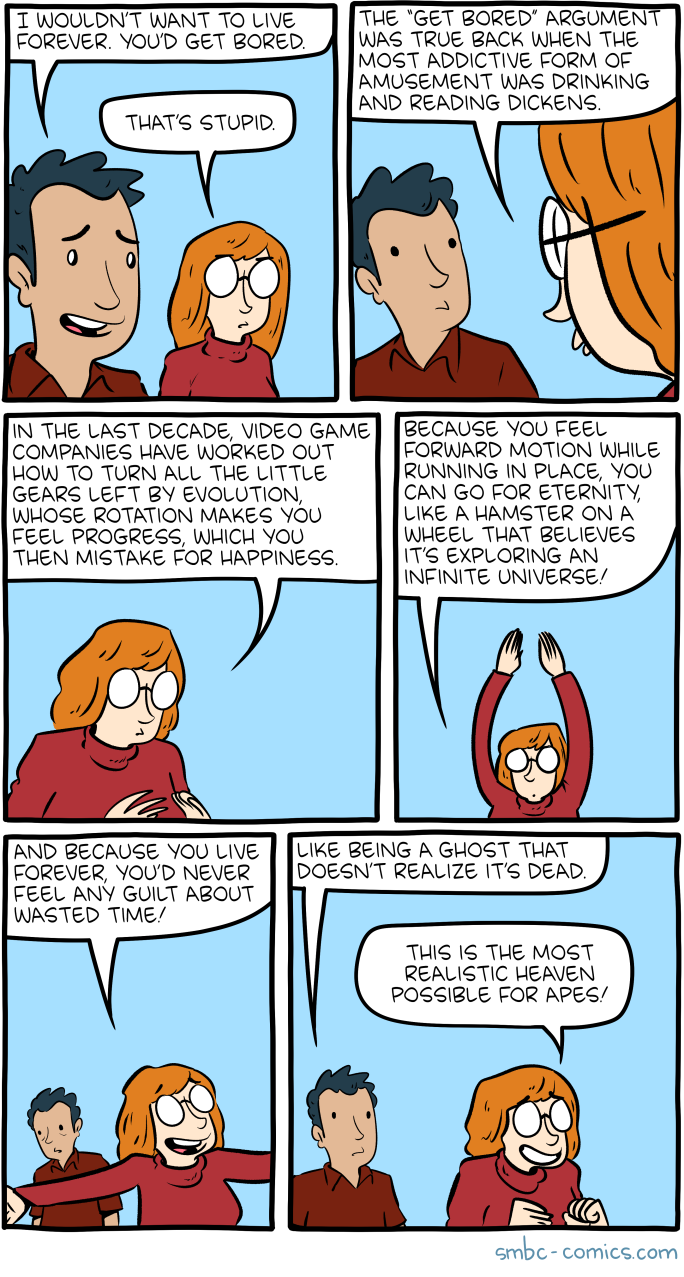
- Tony Benn on Revolutionary Christianity — a lecture from 1980 republished in Tribune Magazine:
In this way a bridge was constructed that carried the message of brotherhood and sisterhood from Christianity to secular humanism, a bridge that carried the ethics across but left the creeds behind. Across this bridge there is now a growing two-way traffic of people and ideas. Christians involved in political action cross it one way. Humanists can cross it to go back to the teachings of Jesus and study them. In a theological sense there is a great divide between the Christians on one side and the humanists on the other. But it is impossible to escape the conclusion that over that bridge revolutionary ideas deriving from the Bible and the carpenter of Nazareth have spread to influence hundreds of millions of people for whom the need for neighbourly love within a common humanity is immediately apparent in a way that the mysticism, liturgies, and arid screeds may appear to be less relevant.
- Doonesbury — by Gary Trudeau:





